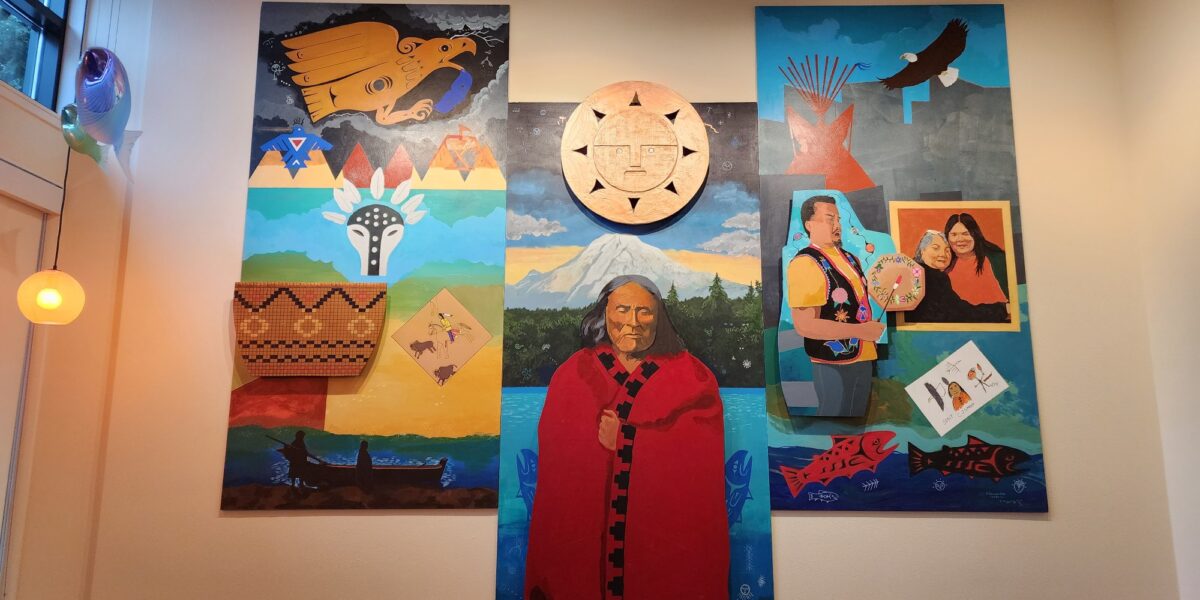
The Native-Owned Businesses Championing Indigenous Food in the PNW
Since time immemorial, Indigenous people have made the lush forests and rugged coastlines of the Pacific Northwest their home. Native American life was deeply intertwined with the land. They drew spiritual inspiration from the towering evergreens, passed down ancient medicinal knowledge, and hunted and gathered according to the seasons and movement of animals.
In Seattle and Portland, the past several years has seen the rise of Native American-owned eateries with a mission to share Indigenous foods, from cafes to food trucks to coffee houses. Three examples at the forefront of this movement are Off the Rez, Bison Coffeehouse and ʔálʔal Café. Not only offering delicious Indigenous meals, these restaurants are spaces where tradition is honored, stories are told, and support is paid back to the Native American community.
Off the Rez: Seattle’s First Native Food Truck
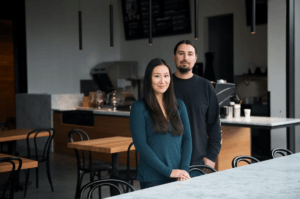
Credit: KUOW Photo by Megan Farmer
Mark McConnell’s mother grew up on the Blackfeet Reservation in Browning, Montana. McConnell himself grew up in Seattle, but has many fond childhood memories of going back to Montana and spending time with family around traditional food.
Fed up with craving the Native comfort foods that his mom used to make and no restaurant in the area providing a place to buy them, McConnell took matters into his own hands.
“There wasn’t any market for [Native foods] here in Seattle,” McConnell said. “There wasn’t anyone doing it, so we wanted to be the first ones to share our culture’s food out here.”
Along with his partner Cecilia Rikard and childhood friend Chef Donovan MacInnis, the trio transformed an old linen truck into Seattle’s very first Native American food truck. They used several recipes that McConnell’s mom had passed down to him, such as bison tacos and frybread. In McConnell’s memories, the crispy, pillowy frybread was reserved for special occasions, and Indian tacos and sweet frybread were staples at birthday parties and powwows. Off the Rez created homemade preserves, jams and all types of toppings over the years to complement their best-selling frybread.
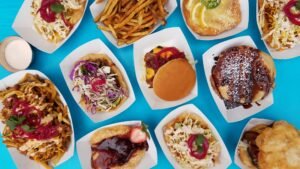
As the first to introduce Native food to the area commercially, the food truck had several customers who were encountering this type of cuisine for the first time. For Native people from other regions, the food evoked nostalgia and a connection to their own traditions.
“We try to collaborate with Native suppliers as much as we can,” McConnell said. Sometimes the team sources bison from Montana. When we spoke to McConnell, he had just bought fresh salmon from the nearby Muckleshoot tribe.
Beyond the infamous Off the Rez food truck, the brand has expanded to a brick and mortar location at the Burke Museum at the University of Washington. The museum has a focus on dinosaurs, fossils, Northwest Native art, plant and animal collections, and cultural pieces from across the globe– making it the perfect place to connect marry the culinary experience with a historical and cultural one.
“There’s a lot of ties between the food and the culture and history [in the museum],” McConnell said. “It’s a great experience to come and try the food, but also go and see artwork and carvings from different periods in our culture.”
Bison Coffee House: A Symbol of Resilience
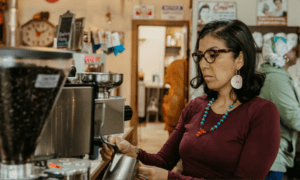
By Ashley Anderson
Loretta Guzman’s journey to founding Bison Coffee House began with a battle against cancer that led her back to her family on the Fort Hall Reservation in Idaho. Loretta herself was born in Portland, but spent her childhood going back and forth between the Oregon town and the Idaho reservation.
While recovering, Loretta had a vision of a majestic bison approaching her. Her stepfather, recognizing the significance, assured her that it was her grandparents healing her in the spirit world. Miraculously, she went into remission, and the vision of the bison became the symbol that marked her coffee shop.
“For the Bannock, the bison are a big part of our history,” Guzman said. “Our Bannock people are bison hunters. So I thought, I have to represent the present and the past.”
When you walk into the coffee shop, a giant bison head holds court over the cafe as a symbol of the resilience of Native American peoples and of Guzman’s own personal journey.
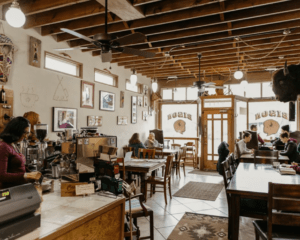
By Ashley Anderson
Along with help from her daughter and other family members, Guzman sells coffee and an array of fresh baked goods that are all made in house, such as espresso coffee cake and green chile pepper jack bacon biscuits. Her cafe is not just about coffee; it’s an avenue to give back to Native American communities.
“Every year, I pick one of the MMIW (Missing and Murdered Indigenous Women) organizations to donate to,” Guzman said. “But I make sure I research them and see it’s a legitimate organization, and that they are really helping our people.”
Guzman has given to the MMIW Database, the Sahnish Scouts, and the Medicine Wheel Ride to name a few of the organizations making a difference.
ʔálʔal Café: Decolonizing Native Food
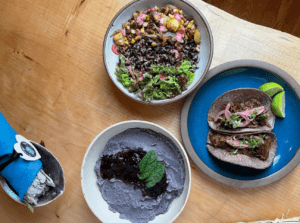
ʔálʔal Café’s moniker, pronounced “All All,” is the Lushootseed word for “home.” The word perfectly encapsulates the vision of the Chief Seattle Club, which owns and operates the cafe.
“We envision a future where our Native community is safe, healthy, housed, and connected to community that respects and celebrates Native cultures,” Akemi Boyd, Grant Writer for Chief Seattle Club, said.
The cafe puts an emphasis on “de-colonized food,” meaning dishes and ingredients that take back the way Native food was prepared before colonization. Bison barbacoa tacos, rabbit stew, blue corn mush, three sisters wild rice grain bowl, and maple sugar mocha are just a few of the items on the menu.The cafe sources ingredients and products from tribes and Native businesses, such as bison from the Cheyenne River Sioux Tribe, wild rice from the Red Lake Nation, and blue corn from Navajo Nation.
“Food is our most immediate connection to culture,” Boyd said. “Through colonization and attempted genocide, many Indigenous people lost connection to their traditional foods. Reintroducing those foods is a healing process and a small step in regaining a sense of self.”
Beyond food, ʔálʔal Café serves as a hub for cultural exchange. The café hosts workshops and events, opening doors to conversations about Indigenous experiences, sovereignty, and heritage.
“The ʔálʔal Café serves as a gateway for the Pioneer Square Community to interact with members and café staff,” Boyd said. “This is a great opportunity for people who may not understand the Native culture, to learn what culture looks and feels like from our perspective.”
Explore the Pacific Northwest:
The Pacific Coast and Willamette Valley: From your starting point in Portland, you will find yourself in a city ringed by old growth fir forests, snow-capped volcanoes, ancient cliffs adorned with tumbling waterfalls, fertile farmland and vineyards, and hundreds of miles of undeveloped coast ripe for exploration. This luxury Oregon road trip provides an unmatched concentration of stunning, diverse Pacific Northwest landscapes enriched by unique adventures and connections with local producers.
Olympic Peninsula and San Juan Islands: Coastal Wanderings: Experience the remote wonders of the Olympic Peninsula, the relaxed pace of life on the San Juan Islands and the buzz of downtown Seattle on this loop around Washington’s idyllic islands and verdant peninsulas. Charming waterfront inns and boutique hotels allow you to sample in style all of the natural wonders and culinary delights that this special corner of the Pacific Northwest has to offer.
